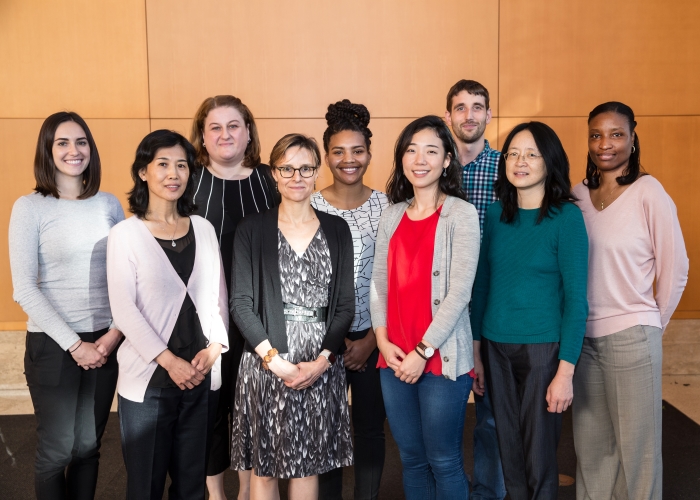B-Cell Immunology Section
Established in 2020
Susan Moir, Ph.D.
Chief, B-Cell Immunology Section

Major Areas of Research
- Contribution of B cells to HIV pathogenesis
- Characterization of virus-specific B-cell responses in HIV-infected individuals
- Pathogenesis of B cells in immune-mediated diseases, particularly primary immune deficiencies
- Characterization of B-cell responses to emerging pathogens, including SARS-CoV-2
Program Description
The primary focus of our research program is to study the role of B cells in the pathogenesis of HIV disease, with the goal of filling gaps in knowledge regarding humoral immunity against the virus. This knowledge is critical to the development of an effective antibody-based vaccine and for advancement of immunotherapeutic interventions in HIV-infected individuals. Our approach involves assessing transcriptional, phenotypic, and functional attributes of B cells that circulate in the peripheral blood and those that reside in tissues, particularly lymph nodes and the bone marrow. A major focus of our research also includes identifying and characterizing various subsets of B cells in blood and lymphoid tissues of healthy individuals and those that are overexpressed at various stages of HIV infection. We have shown that several of these subsets may be responsible for various manifestations associated with HIV disease, including hypergammablobulinemia, inadequate response to vaccination, as well as loss of homeostasis and lymphopenia. Another long-term goal is to apply our knowledge of B cells in HIV to other human diseases in which B cells play a pathogenic role and to investigate B-cell correlates of protection to emerging pathogens, including SARS-CoV-2.
Biography
Education
Ph.D., 1996, University Laval, Quebec City, Quebec, CanadaDr. Moir received her Ph.D. in immunology and microbiology from the University Laval, Quebec City, Quebec, Canada, in 1996. Her Ph.D. studies were supported by a scholarship from the National Health Research and Development Program of Canada. In 1996, Dr. Moir came to the NIAID Laboratory of Immunoregulation (LIR) as a Visiting Fellow. Dr. Moir was appointed to the position of Staff Scientist in 2006, with honorific title of Associate Scientist in 2010. In 2009, the National Institutes of Health (NIH) launched a new recruiting program named for the late Earl Stadtman, an NIH biochemist who mentored several Nobel laureates. Dr. Moir was selected as one of the 2014-2015 Earl Stadtman Investigators and received a tenure track investigator position in the LIR in August 2015. In 2020, Dr. Moir became a tenured senior investigator and chief of the B-Cell Immunology Section in the LIR.
Clinical Studies
Selected Publications
- Buckner CM, Kardava L, El Merhebi O, Narpala SR, Serebryannyy L, Lin BC, Wang W, Zhang X, Lopes de Assis F, Kelly SEM, Teng IT, McCormack GE, Praiss LH, Seamon CA, Rai MA, Kalish H, Kwong PD, Proschan MA, McDermott AB, Fauci AS, Chun TW, Moir S. Interval between prior SARS-CoV-2 infection and booster vaccination impacts magnitude and quality of antibody and B cell responses. Cell. 2022 Nov 10;185(23):4333-4346.e14.
- Kardava L, Rachmaninoff N, Lau WW, Buckner CM, Trihemasava K, Blazkova J, Lopes de Assis F, Wang W, Zhang X, Wang Y, Chiang CI, Narpala S, McCormack GE, Liu C, Seamon CA, Sneller MC, O'Connell S, Li Y, McDermott AB, Chun TW, Fauci AS, Tsang JS, Moir S. Early human B cell signatures of the primary antibody response to mRNA vaccination. Proc Natl Acad Sci U S A. 2022 Jul 12;119(28):e2204607119.
- Wong CS, Buckner CM, Lage SL, Pei L, Assis FL, Dahlstrom EW, Anzick SL, Virtaneva K, Rupert A, Davis JL, Zhou T, Laidlaw E, Manion M, Galindo F, Anderson M, Seamon CA, Sneller MC, Lisco A, Deleage C, Pittaluga S, Moir S, Sereti I. Rapid Emergence of T Follicular Helper and Germinal Center B Cells Following Antiretroviral Therapy in Advanced HIV Disease. Front Immunol. 2021 Dec 1;12:752782.
- Austin JW, Buckner CM, Kardava L, Wang W, Zhang X, Melson VA, Swanson RG, Martins AJ, Zhou JQ, Hoehn KB, Fisk JN, Dimopoulos Y, Chassiakos A, O'Dell S, Smelkinson MG, Seamon CA, Kwan RW, Sneller MC, Pittaluga S, Doria-Rose NA, McDermott A, Li Y, Chun TW, Kleinstein SH, Tsang JS, Petrovas C, Moir S. Overexpression of T-bet in HIV infection is associated with accumulation of B cells outside germinal centers and poor affinity maturation. Sci Transl Med. 2019 Nov 27;11(520):eaax0904.
- Kardava L, Sohn H, Youn C, Austin JW, Wang W, Buckner CM, Justement JS, Melson VA, Roth GE, Hand MA, Gittens KR, Kwan RW, Sneller MC, Li Y, Chun TW, Sun PD, Pierce SK, Moir S. IgG3 regulates tissue-like memory B cells in HIV-infected individuals. Nat Immunol. 2018 Sep;19(9):1001-1012.
- Moir S, Ho J, Malaspina A, Wang W, DiPoto AC, O’Shea MA, Roby G, Kottilil S, Arthos J, Proschan MA, Chun TW, Fauci AS. Evidence for HIV-associated B-cell exhaustion in a dysfunctional memory B-cell compartment in HIV-infected viremic individuals. J Exp Med. 2008;205:1797-1805.
Research Group
Immunologic studies of human B cells in HIV and other infectious and non-infectious diseases


